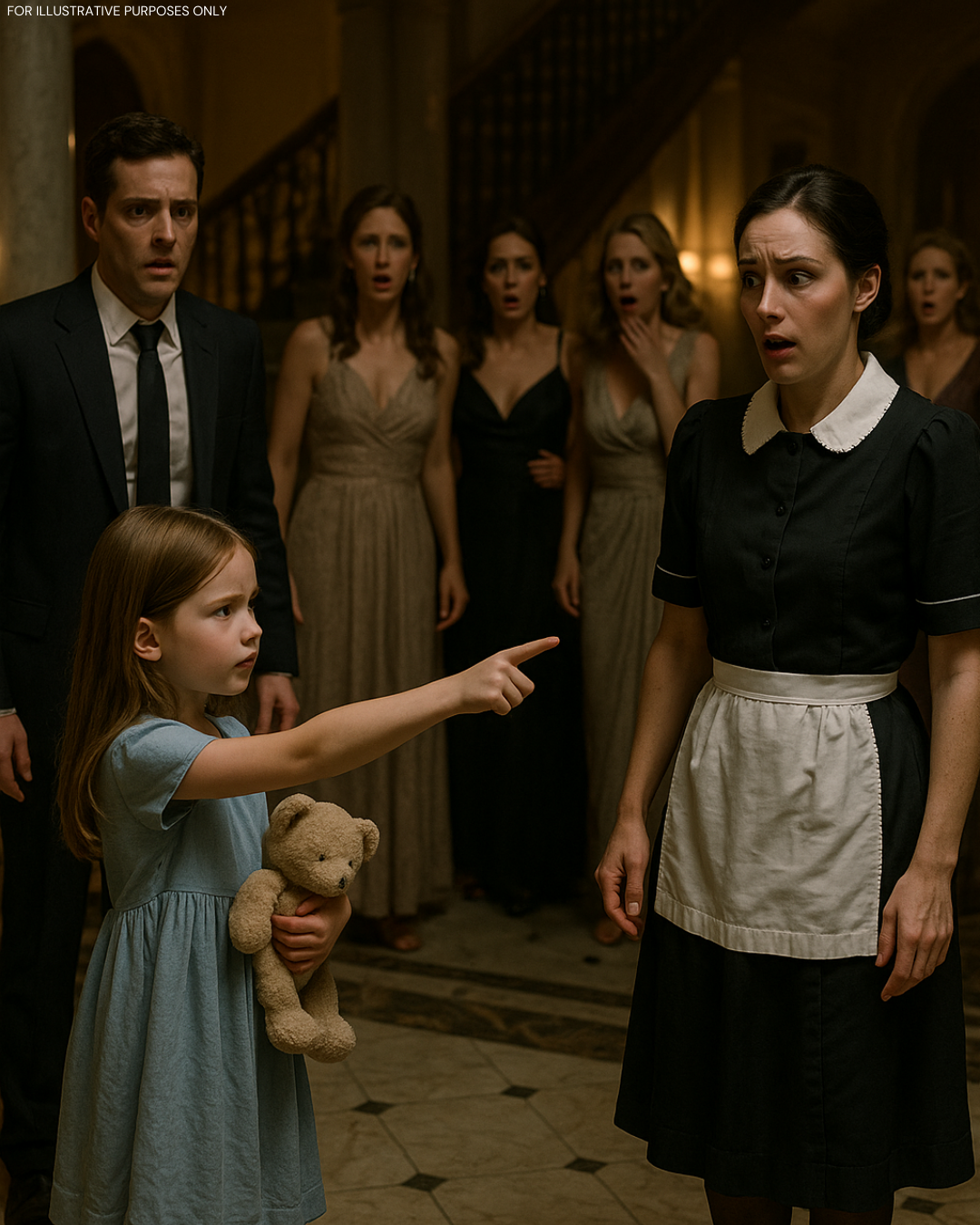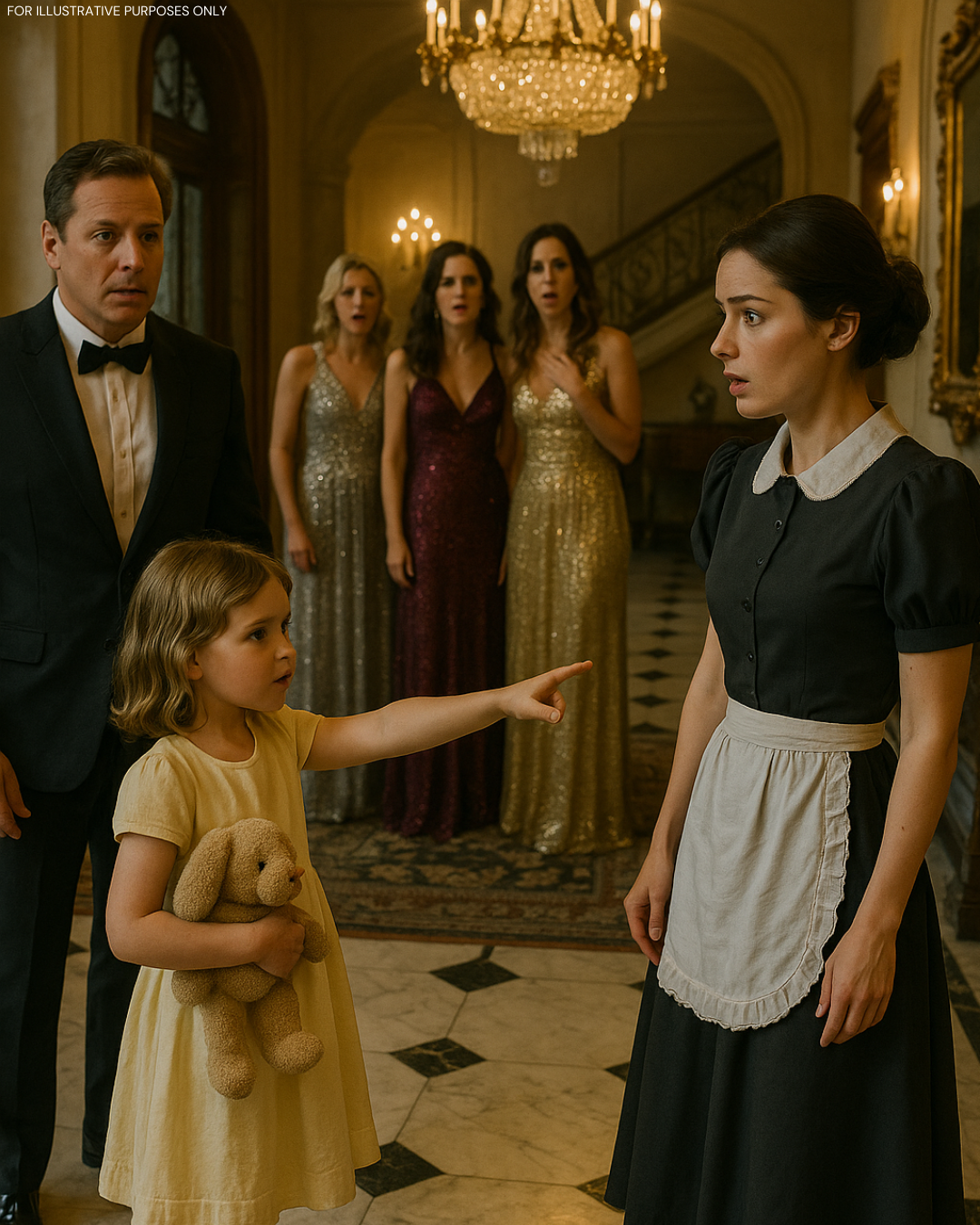
The chandeliers of the Moretti estate glowed with cold brilliance, scattering light over polished marble and mirrored columns. It was supposed to be an evening of control, of elegance, of a father showing his daughter the women who might one day step into her mother’s place. But control was fragile, and sometimes it cracked under the smallest voice.
It happened when little Isabelle Moretti, six years old and clutching a stuffed fox, stood in the hall and quietly said, “I want her.”
Her finger did not point to one of the tall women in gowns glittering like constellations. It pointed toward Rosa, the housekeeper, who froze in her plain black dress, a tray still balanced in her hands.
“Me?” Rosa whispered, pressing a hand to her chest.
“You read me stories,” Isabelle said softly. “When Papa is busy, you stay with me. You make the house feel warm. I want you to be my mother.”
The air thickened. The models shifted, exchanging quick glances, some rolling their eyes, one stifling a laugh. At the center of it all, Matteo Moretti—banker, tycoon, man known for demolishing rivals without blinking—felt his own daughter undo him. He searched Rosa’s face for calculation, for ambition. There was none, only bewilderment and a trace of fear.
That night, after the women departed in sharp heels, after Isabelle had gone to bed, Matteo sat alone in his study with a glass of brandy. He replayed her words again and again: I want her. This was not part of his plan. He had imagined a glamorous partner who could sparkle at galas, sit comfortably with diplomats, charm photographs. Not Rosa, who baked bread that filled the halls with the scent of home, who tied back her hair with the same old ribbon every morning.
The next morning at breakfast, Isabelle tested him. “If you don’t let Rosa stay, I won’t talk to you.” Her tiny hands gripped the glass of orange juice as if it were armor.
“Isabelle,” Matteo began, forcing authority into his tone, “you don’t understand—”
“She understands kindness,” Rosa interrupted gently. “Children feel what we think they don’t.”
Matteo’s jaw tightened. “And you don’t understand the world I live in.”
But Isabelle crossed her arms, stubborn as a general in miniature.

For days Matteo tried to bribe her loyalty back—offering ponies, new dolls, a trip to Rome. Every answer was the same: “I want Rosa.”
And then, slowly, Matteo began to see what his daughter saw. Rosa kneeling to braid Isabelle’s hair while the child wriggled, Rosa listening with her full attention when Isabelle recited a story half-forgotten, Rosa’s laughter turning the girl’s sulks into giggles.
Rosa was no ornament. She was present.
The turning point arrived at a charity reception in Florence. Matteo, in black tie, was performing his usual ritual of handshakes and promises when he realized Isabelle had vanished. Panic struck him like a blow. He found her near the dessert table, tears staining her cheeks.
“She asked for gelato,” the waiter explained nervously, “but the other children laughed. They said she has no mother.”
Matteo felt his chest hollow. Before he could kneel, Rosa appeared. She had come discreetly, not to intrude, but now she crouched before the crying girl.
“You don’t need gelato to shine,” she whispered. “You’re already the brightest star here.”
“But they said—” Isabelle sobbed, “they said I don’t have a mother.”
Rosa hesitated, then looked at Matteo with quiet courage. “Your mother is in heaven watching you. And while she is there, I will be here. Always.”
The room shifted. Conversations faltered. Guests turned, not with scorn, but with expectancy. And Matteo, for once, felt the armor he had worn for years crack apart.
After that night, something changed. The Moretti mansion, long filled with silence, began to echo with laughter. Matteo noticed Rosa not just as an employee, but as the anchor of his daughter’s joy. She asked for nothing. She never hinted. She simply lived with dignity.
One evening Isabelle tugged her father’s sleeve. “Papa, promise me. No more other women. I already chose Rosa.”
He gave a weary smile. “Life isn’t so simple, bella.”
“It is,” she insisted. “Mama in heaven would want it this way.”
Her words pierced deeper than any negotiation.
Months later, Matteo asked Rosa to walk with him through the villa gardens. Autumn leaves littered the path. “Rosa,” he said quietly, “I owe you an apology. I judged you for what you weren’t. But Isabelle was right. Your place… is with us. Will you let me try again? Not as your employer, but as your husband?”
Her eyes filled with tears. She opened her mouth, but a clear voice rang from the balcony: “See, Papa? I told you!”
The wedding was modest. No cameras, no fireworks. Just family, a few loyal friends, and a child who clung tightly to the bride’s hand.

Standing at the altar, Matteo realized he had built an empire out of control and reputation. Yet the foundation he had been missing was not marble or wealth, but love.
Isabelle smiled up at Rosa. “See, Mama? I told him it was you.”
Rosa kissed her hair. “Yes, my darling. You were right.”
And Matteo Moretti, for the first time in his life, understood defeat not as loss, but as victory—the kind that gives a man a family no fortune could ever buy.